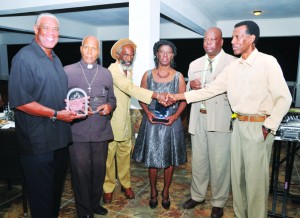
In celebration of its Twelfth Anniversary, Kool FM 103.3 has honoured four former Radio Anguilla personalities whose contributions have had a marked influence on today’s development of broadcasting on the island.
The event was organised by Leroy Richardson (Brother Lee), regarded as the face of Kool FM Radio as a result of his varied community programmes, talk shows and advertising campaigns.
Kool FM’s first Annual Awards Presentation and Oldie Goldie Dinner, as the event was called, took place at La Vue on Saturday, January 19. The awardees were Menes Hodge (now Reverend) who was seconded from the Customs Department in 1969 to the newly-established Radio Anguilla and eventually became its Director; Mrs Patricia Adams (then Miss Christian) who became a full-time Announcer); Val Banks who was a part-time Announcer/DJ; and Ralph Hodge, who served as News Writer and News Reader.
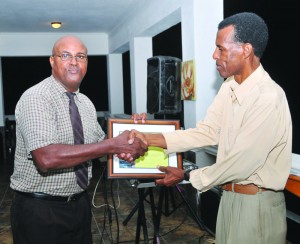
The glass carving awards were presented to them by Nurse Irma Carty on behalf of Kool FM. The recipients expressed appreciation to Mr.Richardson as well as to the station’s owner, Bevan Brooks, for recognising their services.
There was a fifth awardee in the person of Rondie Webster who was not on the award list. He was presented with a Certificate, by Brother Lee, for having served on a number of radio stations in Anguilla and in various other parts of the Caribbean region.
The presentation ceremony was chaired by Iwandai Gumbs, one of the island’s leading radio personalities who worked at Radio Anguilla and is now an influential voice at Upbeat Radio.
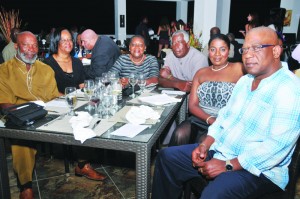
There were two speakers – Quincy Gumbs, a businessman who benefited much from commercial advertising in the past; and Kenneth Hodge, a former Radio Anguilla Director, now Principal Assistant Secretary in the Ministry of Home Affairs with responsibility for Information and Broadcasting and other subjects.
Speaking on “The Power of Radio”, Mr.Gumbs referred to the days in Anguilla when information was passed on by word of mouth, and to the advent of Radio Anguilla in 1969 when broadcasting became the order of the day on the island.
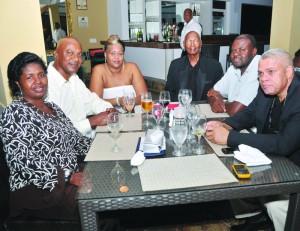
He said that Radio Anguilla had significantly transformed the dissemination of information and entertainment on the island, and he praised the four honourees and others for their work. “They had the task of transitioning the island from an age of darkness to an age of enlightenment,” he said. “We look forward to hearing their voices. I think that these people stood out above everyone else for their role in the dissemination of information and the provision of entertainment.”
Mr.Gumbs also spoke about having received much promotion for the development of his commercial business through the advertising services of Radio Anguilla. He said there were now many other radio stations on the island, all contributing to various shades of opinion, but he cautioned them that they should check the content of their programming to ensure that it was in good taste and in accordance with the law.
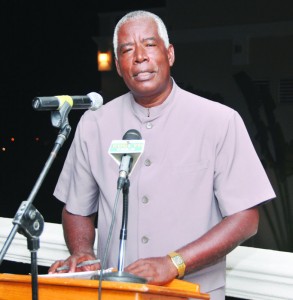
Mr. Hodge, the other speaker, spokeon “Radio From Whence It Came”. He observed that radio was both the cheapest form of communication and a means to reach a wider audience, leading to a very informed society. “Radio is an important watchdog in our community,” he went on. “We can follow up issues in religion, politics and education and other areas. Radio keeps an eye on crime and security in society and we see, for example, how the Royal Anguilla Police Force utilises radio, in particular, to keep members of the public updated on the various crime initiatives that are being undertaken.” He outlined various other benefits of radio communication in terms of public information and the mobilisation of society.
Mr Hodge noted that in Anguilla there were many radio talk shows. “There is therefore a rich forum for persons to express their views,” he stated. “We live in a democracy, and so we encourage healthy debate in our society on all the issues that affect us. It is healthy to hear what everybody has to say on issues.”
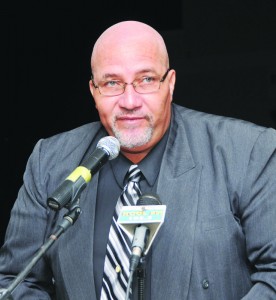
He concluded his delivery as follows: “Living in Anguilla and listening to all the radio stations, I believe they all get involved in the community. I think each station is unique. It brings its own flavour to the listening audience and I think the future of broadcasting here is bright. Here in Anguilla, where we have many issues, radio can continue to be a voice of hope for our people and to encourage them to strive for a better Anguilla.”
Mr. Hodge commended Mr. Leroy Richardson in particular, and other persons involved in organising the event, for honouring the former four outstanding radio personalities. “They have made a significant contribution to the island by their involvement in Radio Anguilla,” he added. “I hope that in the years ahead we will continue to recognise all the persons who helped to shape radio broadcasting in Anguilla– not only in the years gone by, but in the years to come.”








